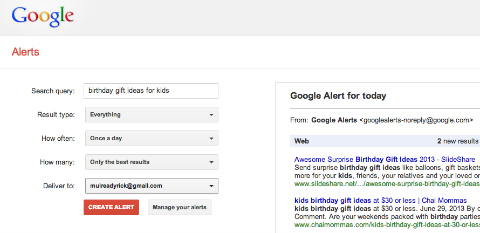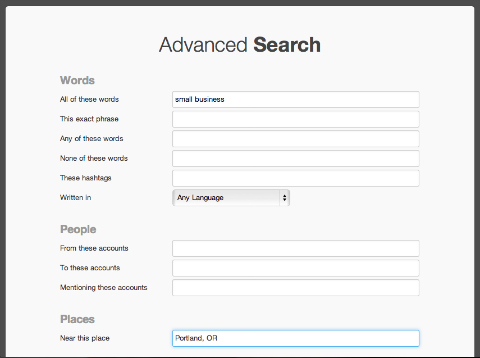 Do you need a strategy to reach your ideal prospects with social media?
Do you need a strategy to reach your ideal prospects with social media?
Are you overwhelmed by all the social media options?
If so, you're not alone. Social media overwhelm is one of the biggest challenges businesses face.
In this article, I'm going to show you three social media strategies so you can focus your efforts on the channels that best align with your business objective and target audience.
The Simple Solution
Fortunately, there's a simple solution for it: only focus on where your customers are.

Once you find out where your customers are on social media, it becomes easier to come up with a strategy that will help you find your future customers.
Here are three strategies you should consider:
Strategy #1: Ask Your Customers
Asking is the low-hanging fruit that's easy for small business owners to overlook. It's such a simple thing to do and allows you to further cement the personal connection you have with your customers.
If you have a brick-and-mortar business, when your customers visit your location, ask whether they use social media. If you have another type of business, figure out the best time and place to ask your customers whether they use social media.
If they do use social media, ask them what channels they spend their time on. Is it Facebook? Pinterest? Maybe it's LinkedIn.
Maybe they don't even use social media. By asking, you'd know.
If your customers are using social media, take it a step further and ask them how they like to be engaged on those channels. This will give you invaluable insight into how you can best add value in a way they'll find useful.
You can also take the same approach if your business is online.
Get World-Class Marketing Training — All Year Long!
Are you facing doubt, uncertainty, or overwhelm? The Social Media Marketing Society can help.
Each month, you’ll receive training from trusted marketing experts, covering everything from AI to organic social marketing. When you join, you’ll also get immediate access to:
- A library of 100+ marketing trainings
- A community of like-minded marketers
- Monthly online community meetups
- Relevant news and trends updates
Most online businesses have an email list. Send your customer contacts an email and ask the same questions. It doesn't have to be the subject of an entire email, necessarily; just a simple “P.S.” at the end of your weekly newsletter or part of a quarterly survey you send out should work wonders.

Implementing this strategy can separate you and your business from your competitors, because so few businesses make the effort to ask. Asking removes any assumptions you may have about where your customers are hanging out online and shows them how much you care.
This is an easy way to get the important information you need to set up a successful social media strategy for your business.
Strategy #2: Use Google Alerts
I'm sure you've heard of Google Alerts, but are you using them?
If not, you're missing a simple and free way to monitor what's going on in your industry and find where your customers are online.
Google Alerts are updates you can set up in Google that allow you to keep track of a specific topic anytime it's mentioned on the web.
For example, you can monitor if you or your business is mentioned across the web or keep track of industry news. When there's a mention of your topic, you receive an email with a link to that search result.
How does this help you find your customers on social media?
Say you're a small toy company that specializes in locally made wooden toys. You have an online presence but want to expand it and you think that social media might be an effective strategy. You're unsure, though, which channels your target audience is using.
You could use Google Alerts to find this out.
You decide to enter “birthday gift ideas for kids” as a search query in Google Alerts. And the results show Pinterest boards and articles on “mommy blogs” that are relevant to your business.

Discover Proven Marketing Strategies and Tips
Want to go even deeper with your marketing? Check out the Social Media Marketing Podcast! Publishing weekly since 2012, the Social Media Marketing Podcast helps you navigate the constantly changing marketing jungle, with expert interviews from marketing pros.
But don’t let the name fool you. This show is about a lot more than just social media marketing. With over 600 episodes and millions of downloads each year, this show has been a trusted source for marketers for well over a decade.
When checking out the Pinterest board, you also find several other boards that are similar to your niche. Bingo! Pinterest may be one social channel you want to focus on.
Here's how to set up your Google Alerts:
- Go to Google Alerts.
- Enter the term or phrase you want to monitor in the Search Query field.
- Choose the type of results you'd like to get in the Result Type field. (I recommend starting out with “Everything.” You can always change it once you see the type of results you're getting.)
- Then choose how often you want to receive the results, how many results you want (I recommend “Only the best results”) and the email where you want to receive them.

Here's how to set up Google Alerts.
Google Alerts require a little market research, but can get you the valuable information you need to find the social media strategy that works best for your business.
Strategy #3: Use the Search Function Within Social Channels
Sometimes you may want to take a deeper dive into researching your customers on a specific social media platform. Or you may love using a certain social platform and want to know whether your customers are there too. You can use the platform's search functionality to quickly find out if your customers use the same one.
Each social channel has a search function that gives you the opportunity to instantly determine whether your customers are using it. And this can be as simple as entering the names of some of your customers in the search box on the social platform.
You can also search on things like your niche topic, relevant industry leaders, brands within your niche and any competitors you might have.
Using the search function is another simple and effective strategy that's often overlooked, yet it will give you great insight into whether your customers are actively using that platform.
If you have a large customer base, consider pulling together a short list selection of the typical customers you want to reach on social media, and then search for them on a social media platform. This would give you information to work with.
Use the Google+ Communities Search:

Or use the LinkedIn Search:

Twitter's Advanced Search is especially effective because not only can you search by all the attributes mentioned above, you can also search within a specific geographic region.

Remember to stay up to date with changes on your favorite social platform. For example, there have been developments recently with Facebook Graph Search.
Conducting a little research on your customers using the search functions on the social platforms can help you determine where you should invest your social media marketing.
Finding Your Customers Doesn't Have to Be Complicated
Use these simple, effective (and free!) ideas to find which social channels your customers are using.
As a business, if you're not engaging with your customers on their terms, you're missing a huge opportunity to add value and ultimately grow your business.
Focus your efforts on the few channels that align with your customers and business objectives and let your competitors be overwhelmed by thinking they need to be on every social media platform.
What do you think? Have you used any of these simple strategies to find out which social channels your customers are using? What other strategies have you used to find where your customers are online? Let me know in the comments below.
Image from iStockPhoto.
Attention Agency Owners, Brand Marketers, and Consultants

Introducing the Marketing Agency Show–our newest podcast designed to explore the struggles of agency marketers.
Join show host and agency owner, Brooke Sellas, as she interviews agency marketers and digs deep into their biggest challenges. Explore topics like navigating rough economic times, leveraging AI, service diversification, client acquisition, and much more.
Just pull up your favorite podcast app, search for Marketing Agency Show and start listening. Or click the button below for more information.

